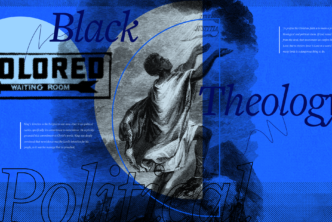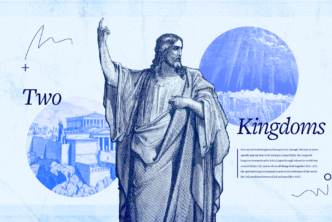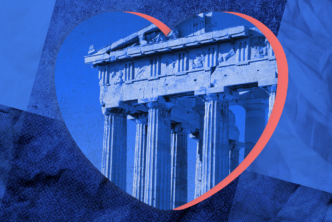By Aubry Smith
Through windows, televisions, and internet portals, my view of the world looks bleak. Conflicts erupt across the globe; protests escalate into riots. The global refugee crisis continues to expand, and injustices in refugee camps call out to us. Shooters invade schools, synagogues, mosques, churches. In my own life, the past few years have seen my mother’s descent into dementia, then her sudden death by cancer, and the suicide of my younger brother. It often feels as if the darkness is overcoming the light.
Revelation uncovers the ‘true state of things’
The book of Revelation was written during dark times, and it can be a tough book to read. It is full of difficult symbolism, controversial timelines, and startling images of catastrophe. The book’s name in Greek, Apocalypsis (from which we get our word “apocalypse”), conveys a sense of uncovering something that is hidden. What is hidden from us, and what does Revelation reveal?
The early Church was in the midst of hardship and persecution and facing the darkest evil in the world when Revelation was written. Here in the Bible’s final pages, God, in his mercy, uncovers the true state of things for his people. The slaughtered Lamb is truly the victorious Lion of Judah, whose death paradoxically conquered the enemy (Rev 5:5–6). While it looks like the enemy is slaughtering those who will not worship the image of the beast and receive his mark, God is raising up an army with the Father’s name written on their foreheads (13:16–14:1).
Finally, Revelation ends with the death of death itself, with Jesus judging all injustice and setting things right, and with God dwelling with his people once again (19:11–16; 21:1–26).[pullquote]
Revelation is the ultimate promise that no matter how things appear, the darkness has not and will never overcome the light. [/pullquote]
At the center of it all is the “One who sits on his throne”—the picture of God’s sovereignty, stability, and steadiness. Revelation is the ultimate promise that no matter how things appear, the darkness has not and will never overcome the light.
Revelation reveals God’s justice
As the people of God wait for Jesus’ coming and endure tragedy, trauma, and trial, they are told repeatedly to have patient endurance and to be faithful witnesses of Jesus. The true testimony of the people of God stands in contrast to the lies of the enemy of God. Revelation 12:11 tells us that believers triumphed over the Accuser “by the blood of the Lamb and the word of their testimony.” Jesus’ work on the cross is the basis of our hope, which we cling to in faith, and we must speak the truth not only in our own hearts but to the world as a testimony.
The world needs our spoken testimony more than ever. Amid the complexity and hopelessness of systematic injustice, we proclaim the truth that God’s justice will one day prevail. Amid the cynical lie that the world is devolving into oblivion, we groan and pray as we await new creation. In the throes of suffering, we must fight the lie that God doesn’t care with the truth that he is present, near, and full of love.
Revelation calls us to lift our eyes to the way things truly are in God’s cosmos: he is the One who sits on the throne. Every knee will bow before him, every tear will one day be wiped away, and the darkness will never overcome the light.
This article originally appeared in the March/April 2019 issue of Bible Study Magazine.
***
Save up to 50% on eschatology resources from renowned scholars and theologians including:
- Revelation, 2 vols. (International Theological Commentary | ITC) NR – Save 50%
- Mobile Ed: TH341 Perspectives on Eschatology: Five Views on the Millennium (4 hour course) – Save 25%
- The Eschatology of the Old Testament – Save 25%
- Climax of Prophecy: Studies on the Book of Revelation – Save 25%
- Between the Cross and the Throne: The Book of Revelation – Save 20%






